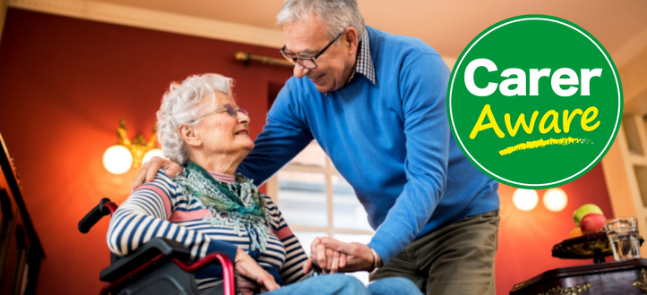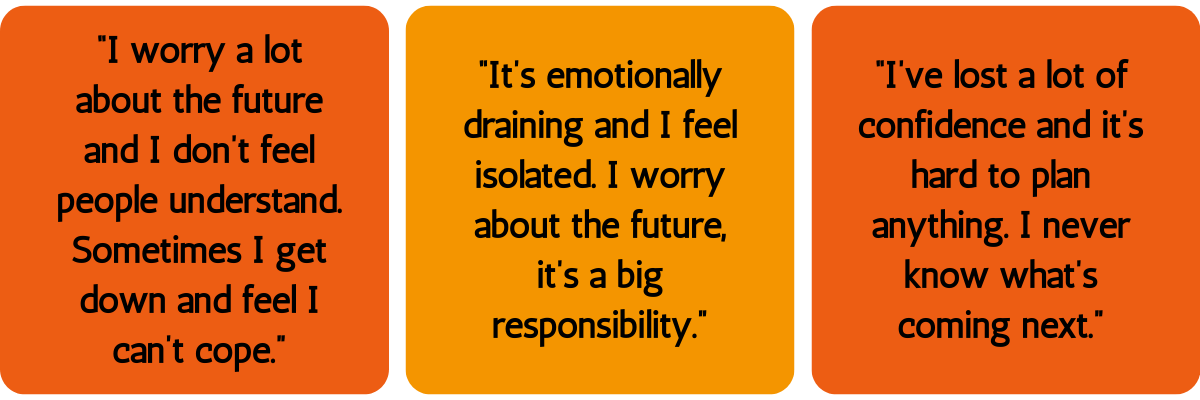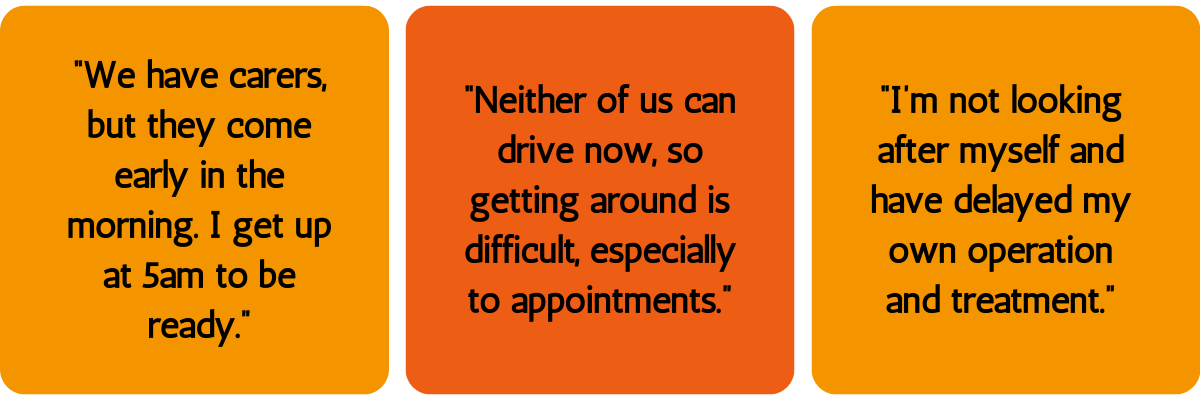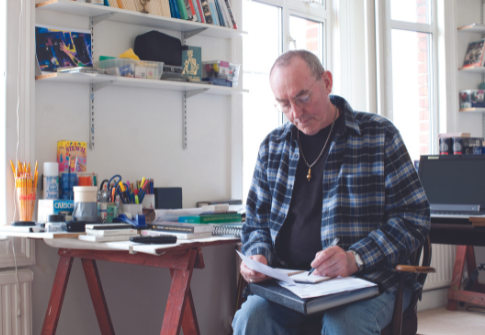Carers' Information
We know that being a carer can be hugely satisfying and rewarding but if you are an older carer you may also have your own needs and face specific challenges.

We're working to ensure carers around Gloucestershire are supported and informed.
Caring for someone can test your dedication and strength, physically and emotionally, often leaving you feeling as though nobody really understands. You are not alone.
We have been asking local older people around Gloucestershire about their experiences of caring and how it made them feel. Our conversations highlighted so many different elements of caring which need to be considered in order for us to provide better provide information and guidance for carers. We’re so thankful to those who contributed and hope that by sharing their thoughts, other people providing care for someone else may be able to find the reassurance, understanding and support they need. Our carers told us that things would have been easier if they’d been prepared for what was to come. The most consistent piece of advice from our carers was don’t try to manage alone, ask for help!
You can find our piece 'From one Carer to Another' from the 2022 Summer Edition of our Grapevine magazine here.
Are you a Carer?
Through our conversations it seemed that some people weren’t aware that they should consider themselves carers. Almost half of the people we spoke to were providing primary care for someone either in the same home or from a distance, without identifying themselves as a carer. It can be hard to recognise yourself as a carer, but it’s important that you do, as it means you can access the help and support you need to look after your partner, relative or friend and indeed, yourself.
You are a carer if, for example you:
- Are on hand 24 hours a day
- Call in to visit someone regularly at their house, or even a care home, to check how they are
- Arrange hospital appointments by phone
- Drop in to see a disabled friend regularly to provide a meal and some company
- Move in with a relative to help them recuperate after a major operation
Ensuring your GP is aware that you are caring for someone can be helpful, it may allow you access to additional support within your surgery.
Caring can be Emotional
As a carer you may experience all sorts of feelings and emotions along the way and people react differently. It’s normal to feel a mix of emotions about your life as a carer but it may feel hard to truly express how you are feeling. Caring for someone can take its toll mentally, tasks such as organisation of appointments or schedules or remembering information on medication can be hard.
Here’s what some of the carers we spoke to told us -

Here are their suggestions for how to cope with this –
- Talk to other carers, it will remind you you’re not alone. Tell friends, family and professionals how you feel and about your loved one’s condition.
- Acknowledge to yourself that you’re a carer. It’s easier to cope emotionally if you identify as a carer to yourself and to other people.
- Remember you’re doing the best you can, even though the support you are giving might feel unappreciated at times. If you’re struggling, it’s okay to look for help.
- Try to remember that some days will be harder than others.
- Don’t stress yourself too much, there will be jobs that don’t get done but don’t focus too much on this.
- Keep in touch with friends and family who can help support you practically and emotionally.
Caring for someone can challenge you physically
At a time in your life when you’re likely to be slowing down, you can find yourself with a big physical challenge ahead of you and this can feel overwhelming. When your focus is on someone else it can be easy to overlook your own needs.
Here's some of the thoughts from the carers we spoke to -

Here are their suggestions on how to help with these struggles -
- Ask for help! Friends, neighbours and relatives often really want to help and are happy to be asked, you shouldn’t feel guilty asking.
- Accept support when it’s offered, you need time to rest in order to keep going.
- Find out what professional support is available, our Help Team can help you find this support.
- Keep a list of important phone numbers to hand, this can be handy if you find yourself in a difficult situation (GP, Dentist, Care Service Provider, Personal Alarm Provider, Telecom Provider, Energy Supplier, IN case of emergency or Next of Kin).
- Build a good relationship with your GP and other professionals involved.
- Make sure Wills and Powers of Attorney are up to date, it’s a tough subject to talk about but so important to ensure your wishes are known.
- Look after yourself, eat well and try to stay active, mentally and physically.
- Try to make time for yourself, ask for respite if it helps you both and use the time to do something for you, even if it’s just having a rest. Our Social Groups could be a great way to get some respite and meet people.
- Get online if you can, a computer can be a lifeline.
- Make sure professionals are listening to you, you know your loved one best and your thoughts should be listened to.
- Talk to others who understand your situation, joining in groups and activities can really help, our Help Team can help you find these.
- There might come a time when you need care too, it’s a good idea to have a plan.
- Find out what financial help and benefits are available for you as a carer, the extra money can make a big difference. Many benefits are non-means tested so you won’t be asked for details about your income or savings. Our Help Team can provide assistance with this.
Navigating the support available can be difficult and confusing, our Help Team are able to provide you with clear information and guidance based on their solid understanding on what is available for carers within Gloucestershire. Contact them on 01452 422660, pressing option 1 or email them at helpteam@ageukgloucestershire.org.uk.
Caring for someone living with dementia
When caring for someone with dementia you may face another set of challenges. How people experience this could also vary greatly due to the different needs the person they are caring for has. It could be that they are physically fit but unable to be left alone or they may be living with an additional set of physical challenges alongside dementia.
Here are some words of advice and encouragement from the carers who spoke to us -
- Avoid giving your love one too many choices to make situations more manageable.
- Encourage him/her to do things for themselves and know when to leave them alone
- Talk about dementia, it’s really positive for others to see you out and about doing things together
- The person you’re caring for is probably frustrated too, so working together you can decide how you can help, but also allow them to still feel in control
- Writing things down as reminders for your loved one can be helpful
- Try to learn how to treat your loved one to get the best response from them
What does this mean?
When caring for someone there can be so much information coming your way. It can be overwhelming to deal with and isn't helped by the language used by the different people and professionals you may have to deal with. People can use acronyms and phrases which feel obvious to them but may as well be a foreign language to others. If there’s something you don’t understand, don’t feel embarrassed about asking what it means. We've put together a list of these based on the experience of those we spoke to.

Here are some of the most common words, phrases and services explained -
ASC - Adult social Care. Formerly known as Social Services, this is a department within the local council responsible for assessments and adult care planning, including Carers Assessments.
CA - Carers Assessment. Any adult who looks after another adult with care and support needs is entitled to a Carers Assessment from the local authority.
Carers Allowance - A financial benefit you may be eligible for if you, the person you care for and the type of care you provide meets certain criteria.
CNA - Care Needs Assessment. An assessment of an adults needs carried out by the local authority if you are having difficulty with day-to-day tasks at home
CHC - Continuing Healthcare. This is NHS funding for adults with long-term complex health needs.
LPA - Lasting Power of Attorney. The legal authority you give to someone to make decisions on your behalf.
OT - Occupational Therapy or an Occupational Therapist. A healthcare professional who’s aim is to improve an individual’s ability to manage everyday tasks if they are having difficulty managing things.
Respite - Respite Care can be a long or short term planned or emergency break for unpaid carers.
Contact the Age UK Gloucestershire Help Team on 01452 -422660 for further help and explanation of these or other terms you may not find familiar or to request a free copy of the Age UK Information Guide “Advice for Carers”.
Age UK Gloucestershire is here to help
Our Help Team are here to provide information, advice and reassurance for you about a whole range of issues and support you may need as a carer. We can talk to you about all the tips and information our carers provided and help you work out your action plan. We’ll check if you qualify for any benefits such as Carers Allowance or Attendance Allowance and if so, we’ll help you through the application process. The Team can help you navigate the care system, talk to you about adaptations to your home and provide details about social groups and respite options.
Call the Help Team on 01452 422660, press option 1
Lines are open 10am-3pm Monday to Friday
